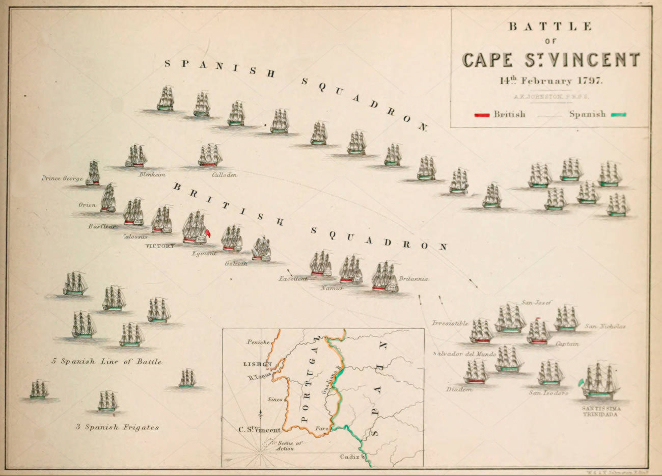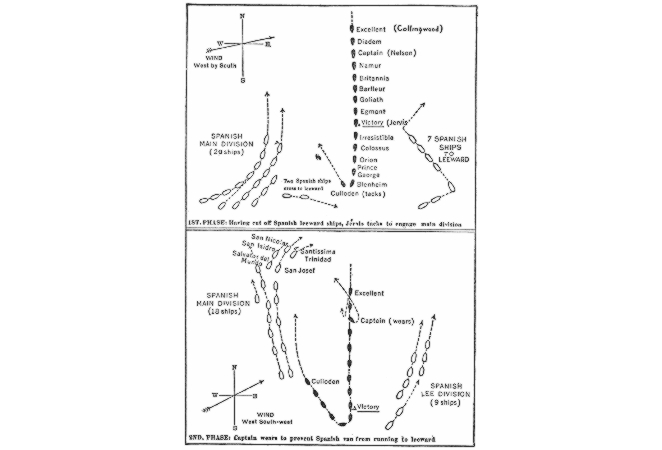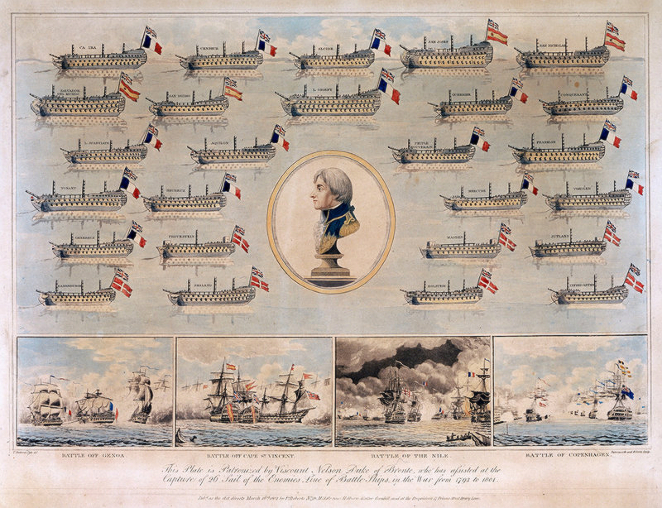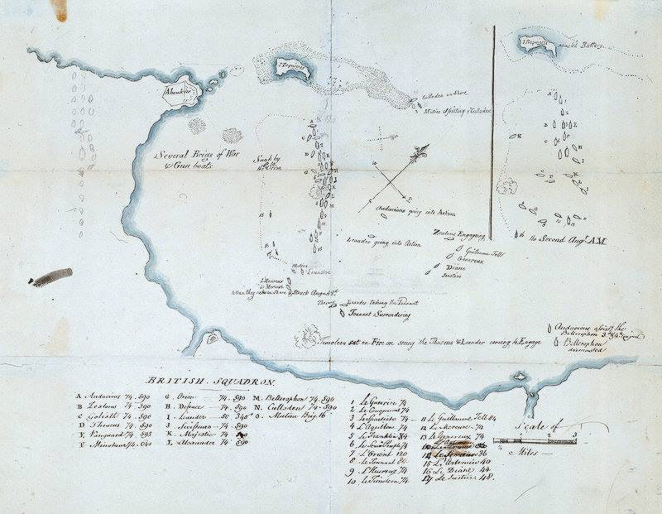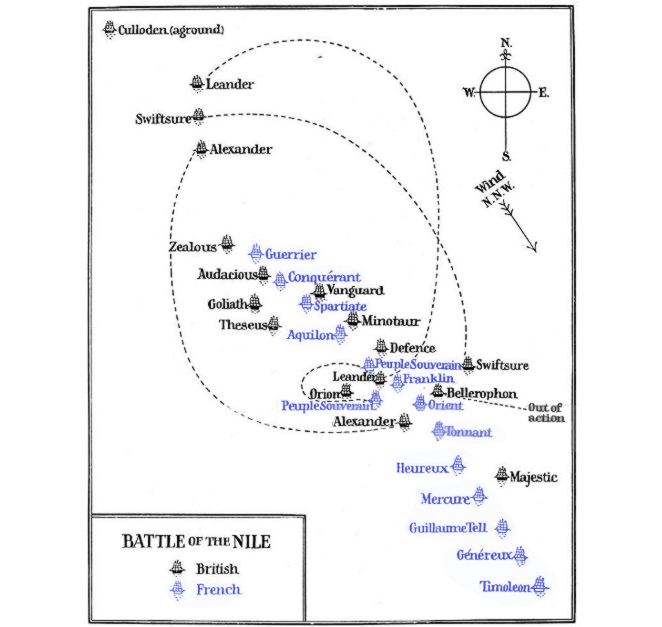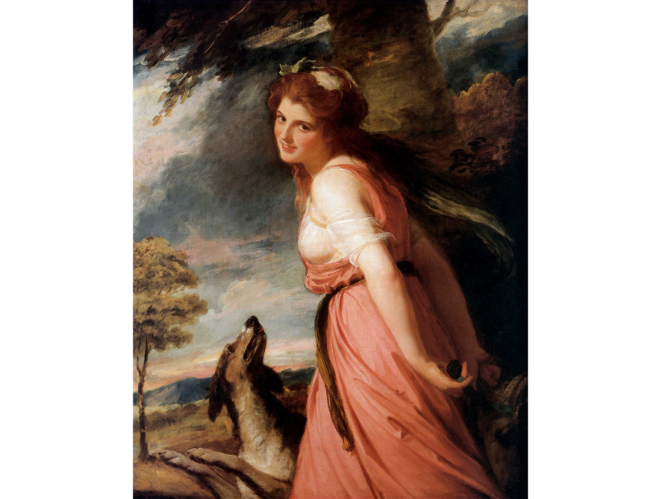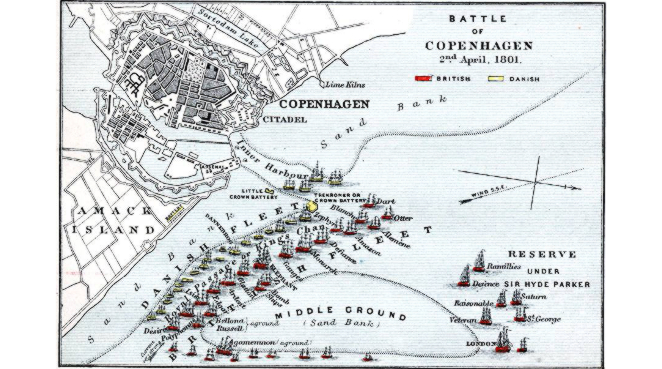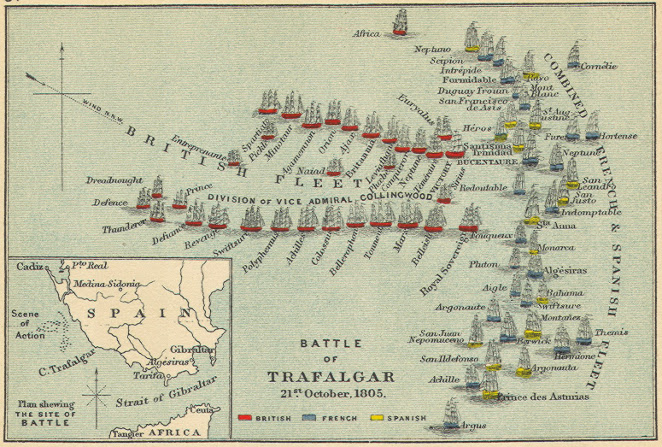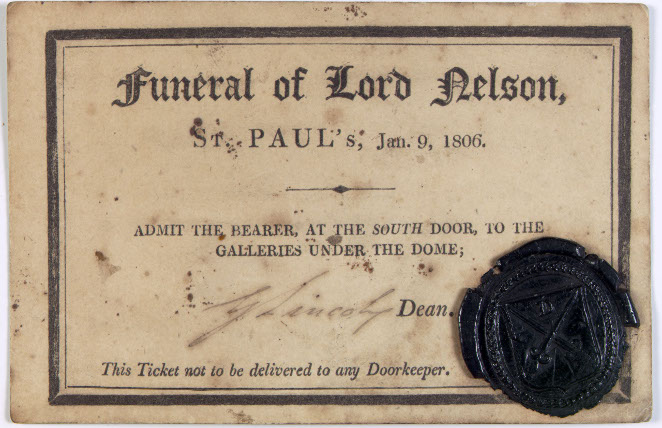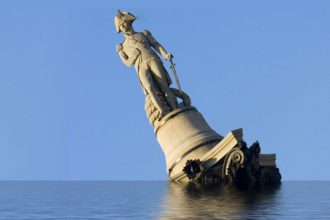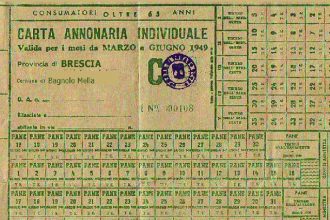Nelson, natural born predator
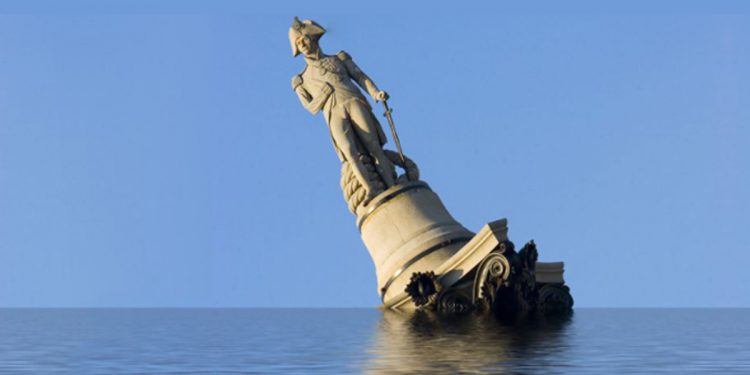
“There are eight sail of the line, Sir John”
“Very well, sir”
“There are twenty sail of the line, Sir John”
“Very well, sir”
“There are twenty five sail of the line, Sir John”
“Very well, sir”
“There are twenty seven sail of the line, Sir John”
“Enough, sir, no more of that; the die is cast, and if there are fifty sail I will go through them”
The chronicles of the time reported this conversation, which took place between Admiral Sir John Jervis, at the time commander of the Mediterranean Fleet, and the captains Calder and Hallowell that from the Victory’s bridge were counting the ships that made up the Spanish fleet en route to Cadiz, off Cape St. Vincent at dawn on February 14, 1797. Natural born predator
Sir John knew the position of the Spanish fleet, who next intended to join with the French in Brest, but he didn’t know their strength, because it had been detected three days earlier by Nelson in the fog, and we don’t know if it gave him a minimum of a disappointment to discover that the enemy’s ships were almost double his.
Natural born predator
The Battle of Cape St Vincent Click the image to enlarge
Probably not, war at sea at the time was difficult to fight, it was even difficult to bring one’s vessel within range so as to fire, and position it relative to the wind, the skill of the crews and the speed of the cannon fire were much more important the number of ships.
For over a century the fleets of warships fought in a line of battle, one behind the other, to optimize their firepower and to protect each other, because when one of these ships was with the stern or the bow exposed to the enemy’s side, and therefore defenseless, she could be considered lost.
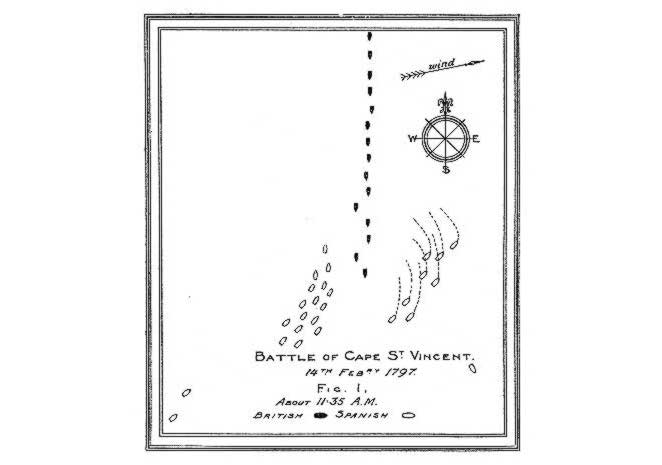
The Battle of Cape St Vincent, 14 Feb.1797, ca. 11:35
That morning, with the wind almost from the west, a fourth to the south, the Spanish fleet, divided into two parts and not yet ready for battle, was sailing to the north, the direction from which the English ships were coming with starboard tack; the Spanish ships to the east, very much downwind, were simply in the condition to disengage, but they couldn’t bring themselves in a useful position for combat; Jervis’ warships, already arranged in line, could instead be wedged with no obstruction between the two sections of the opposing fleet, to shoot with both broadsides, and this they did, until the admiral ordered to turn the bow to move port tack like the Spaniards, and attack the heart of their deployment on the west side to leeward.
It was a textbook maneuver, which, as almost always happened in clashes between large fleets, would end with the Spaniards on the run, but with little damage and few casualties; Nelson, commanding the Captain, a vessel of 74 cannons, was the third last of the English line, and realized that from that position he would probably not be able to fire a single shot.
Natural born predator
The Battle of Cape St Vincent, 14 Feb.1797, first and second phases
Click the image to enlarge
He decided incredibly quickly; ignoring at the same time the rules of the Royal Navy and the order of Jervis, he executed a stern tack and headed against the head of the Spanish fleet of three vessels of respectively, 84, 112 and 130 cannons, while the rest of the English fleet engaged the rear guard.
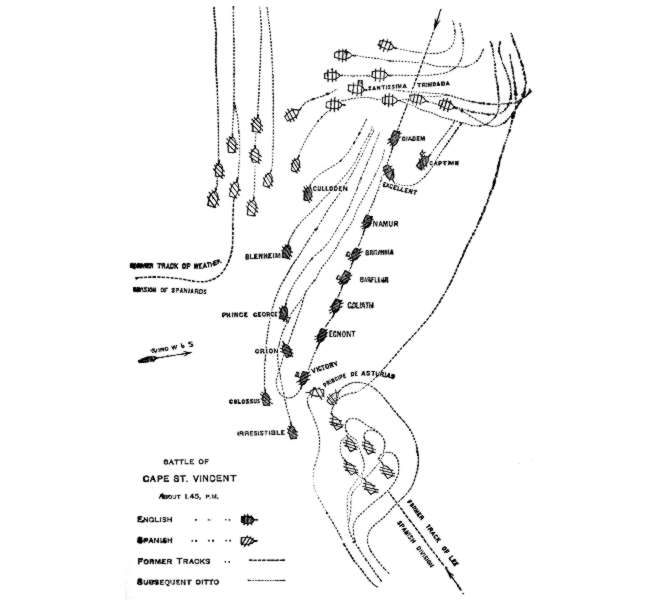
The Battle of Cape St Vincent, 14 Feb.1797, the third phase, ca. 13:45
In the Royal Navy one could be hanged for much less, but Jervis, who when necessary didn’t disdain these methods, was anything but a fool, and understanding the effectiveness of Nelson ‘s reckless maneuver ordered the last row of the ship, Collingwood’s the Excellent, to perform an identical action; Nelson, did the rest, who with the Captain, by now reduced to a wreck, boarded the San Nicolàs, forcing her quickly to surrender, just as Collingwood pushed the larger San Josef against her with gunfire.
The epilogue is known as “Nelson’s patent bridge for boarding enemy vessels“, because the crew of the Captain, passing from the San Nicolàs to the San Josef, in aa feat never before accomplished also seized te larger vessell.
Natural born predator
Of the four captured Spanish ships, two had been Nelson’s prey, while the flagship, the Santisima Trinidad with 130 guns, at the time the largest ship ever built, seemed to have initially surrendered before she could escape, had been severely damaged.
The ships captured by Nelson 1793 - 1801
Nelson was knighted and promoted to Rear Admiral, while Jervis was made Earl of St. Vincent and Baron Meadford, and above all, in 1801, First Lord of the Admiralty, a position from which he could certainly promote the career of the man who had made his fortune, and that with his usual wit would have defined, in a certainly appropriate manner, “a natural born predator”.
Natural born predator
Over the next eight years that he had left to live Nelson built his legend of the brilliant and successful Admiral, as well as undisciplined, a brave soldier to the point of recklessness, and his splendid arrogance that ignored any convention and any authority except, perhaps, that of the king; in doing all this he revolutionized the tactics and strategy of war at sea, and established the supremacy of the Royal Navy to such an extent that for a century very few have had the courage to face it, and only if they really had no choice.
Then came three great naval battles to mark the next chapter for Nelson, each with a different twist, and all are stories that deserve to be told. Natural born predator
In 1798, he returned to active duty after the amputation of his right arm due to a wound received in the failed attack on Santa Cruz de Tenerife the previous year (he had also lost an eye in Corsica in 1794, and already many teeth because of scurvy due to his long stays at sea), Nelson was sent by Jervis to chase Bonaparte, who had managed to escape the blockade of Toulon to head, as would be learned later, towards Egypt. Natural born predator
Nelson, with 14 vessels, put out to hunt of the French, suspecting that their destination was Alexandria, suspicion confirmed by their sack of Malta, but because the sea is vast he sailed past them without seeing them and found the Egyptian port empty; he drove towards the Bosphorus the same morning when it Bonaparte would arrive, and this was truly one of the sliding doors of history, because if he had arrived a day after he could have surprised the French fleet intent on unloading the troops and their goods from the transport ships, in the utter inability to defend themselves.
Natural born predator
The Battle of the Nile in Aboukir
Click the image to enlarge
It went differently; after traveling the Mediterranean for naught up to Syracuse, where he arrived in late July, exactly one month after his departure from Alexandria, and now knowing of the French landing in Egypt, Nelson immediately put sail again towards the east, to get in front of the Bay of Aboukir in the evening of the first day of August; the French fleet was anchored in a battle line from southeast to northwest, relying on the protection of the shallow water, 8 meters, on the port side, and thinking of having to defend itself only from the sea had the left side partially disarmed for general maintenance .
Natural born predator
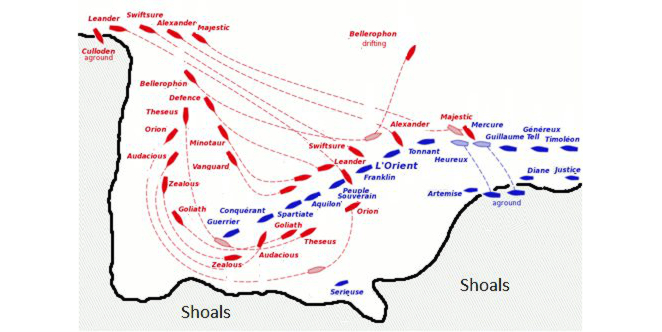
The Battle of the Nile in Aboukir, second phase
They were two fatal mistakes, Nelson attacked at dusk, not dawn the next day as Admiral Brueys had imagined, with the wind almost at fil wheel, on both sides of the French line, counting on the fact that his ships, smaller than the enemy’s, had enough water in which to navigate; the French, taken at anchor and between two firing lines, had no chance, and the morning of August 2nd only two ships and two frigates had managed to escape, with the rest of the fleet burned, sunk or captured: when L’Orient, the French flagship exploded, carrying the treasure of the Knights of Malta, the glow was seen as far as Rosetta, 30 km away. Natural born predator
The Battle of the Nile in Aboukir, last stage
Click the image to enlarge
By contemporary standards, the four ships captured at Cape St. Vincent had been a tremendous achievement, but a fleet of 12 ships, plus a frigate and a brig, for the sake of accuracy, had not been destroyed with one fell swoop, and the impact of Nelson’s victory was enormous; there was probably an echo of Aboukir in one of Jervis’ most caustic and cutting jokes, when he said in Parliament, where among other things sat as an authoritative representative of the Whig Party: “I do not say that the French gentlemen can not come, I say they can not come by sea “.
The “band of brothers” that he had built with the Fleet in the Mediterranean, as the warship commanders called each other, and that he had then given to be commanded by the “natural born predator”, had proven to be the deadliest war machine that had ever sailed the seas; they didn’t have the largest ships, were not the fastest and most were not the most heavily armed, in short they were not the best vessells, Nelson would always envy the French and Spanish ships, but were the best conducted, with the best highly trained crews, capable of manouvering at twice the speed than others, could shoot three broadsides in the same mount of time that it took their opponents to shoot two, and they had a ferocity and determination in fighting completely unknown at a time when naval battles consisted of some brief skirmishes interspersed with endless downtime.
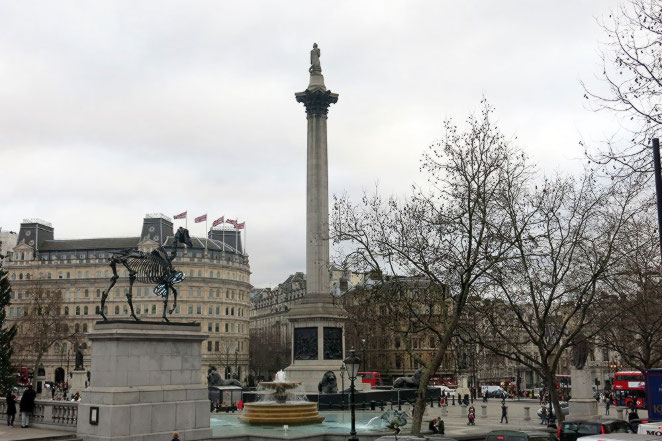
Trafalgar Square, London with Nelson's Column at the center
Nelson in the space of one night had become the hero of all anti-French Europe, he was an icon, the only one who could look down upon Bonaparte, he could do whatever he wanted, and he did.
The first stop was Naples, where 1799 closed, in blood, the short history of the Neapolitan Republic, showing that perhaps too much ill is said of Cardinal Fabrizio Ruffo di Calabria, who, as well as having negotiated honorable terms of surrender for the Republicans, didn’t stoop to being a doormat to a pair of scoundrels like Ferdinand IV and Marie Caroline of Austria.
Natural born predator
Lady Emma Hamilton as a Bacchant, George Romney
Click the image to enlarge
The Neapolitan revolution was essentially a headlong rush of the best middle class and the more enlightened aristocracy of the kingdom, lacking popular support and quickly defeated by an incongruous alliance between the poorer classes and the conservative nobility, but as the cardinal, who led counterrevolution, knew, he had defeated the best ruling class which the country could aspire to, and certainly did not want to insist further, the two monarchs propped up by the British didn’t have a fraction of his intelligence and political savvy..
The repression was very harsh (of about 8000 prisoners, 124 were put to death, minus 6 who were eventually pardoned, 222 life sentences, 322 with minor penalties, 288 deported and 67 sent into exile, and it goes without saying that the penalties did not concern the laborers of the revolution). It is likely that this was the beginning of the end for a city that was the third European capital after London and Paris; the symbolic hanging of Francesco Caracciolo from the Foudroyant’s flagpole, decided autonomously by Nelson under pressure from Emma Hamilton, switching to capital punishment the prison sentence that had been imposed by the Neapolitan court, remains an absolutely disgraceful page in his biography, with he has proven to be a fanatic, not only in battle, but also in politics and in private life. For what it’s worth, and I believe it very much should, Nelson had fought with Admiral Caracciolo a few years before against the French.
If Nelson’s cry of encouragement to his sailors when they jumped on the San Nicolás bridge was basically ridiculous (“Westminster Abbey or glorious victory”), the hanging of Caracciolo is something that still elicits rebuke, even at the distance two remote centuries removed, and the fact that at that time he was dominated by Emma can only make things worse.
Natural born predator
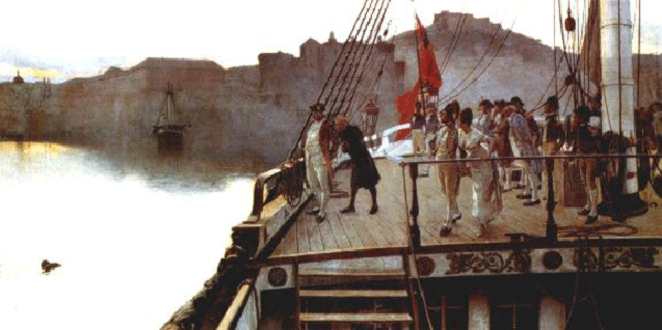
Naples, June 1799 - After a few days at sea the body Admiral Francesco
Caracciolo, water logged, resurfaced just below the Foudroyant, Nelson's
flagship, where the King, recently arrived from Sicily, was a guest and it
seems that the scene was also witnessed by Emma Hamilton, Nelson's
mistress and by her complacent husband, the British Ambassador William
Hamilton.
The affair with Lady Hamilton was the peculiar event of this period, and offers the opportunity to digress from facts to opinions. While Nelson was forty, wrapped in the golden aura of the legendary hero, but being also mutilated, one-eyed, and toothless, arouses sympathy when he takes as a lover the English ambassador’s wife, imposing for good measure and hypertrophied ego a menage a trois to the best of London society, that behind the formally outward approval must have foamed with rage at its audacity, on the other hand it is difficult to ascribe to Nelson, in this case, the role of the natural predator, but rather that of the prey.
Natural born predator
Emma was a bit younger, had been born poor and had climbed all rungs of society, from the brothel, well before the age in which she met him, to the wealthy lovers, and finally to the Neapolitan court, through her marriage to the Ambassador and English scholar, Sir William Hamilton, 35 years older, and all this thanks to a beauty matched only by ruthlessness. Natural born predator
Three things are impossible to forgive Emma, to have become, like many enriched poor, a strong backer of her new privileges and a 24 carat reactionary, to always abandoning all the children she had had from her many relationships, and to having agreed to call Horatia the child she had with Nelson.
The best that can be said of the Admiral, at the end of this gossipy digression, is that Sir John in his place would have been much smarter, and that he would not have allowed anyone to tell him the name of those who were to be hung from the yardarm of his ship.
Natural born predator
The Battle of Copenhagen
Click the image to enlarge
The second stop was Copenhagen. Nelson was sent there in 1801, as second to the irresolute Admiral Sir Hyde Parker, to explain well to the Danes and the Norwegians how counter-productive an alliance with Bonaparte could be, and after the brief diplomatic negotiations immediately failed, the clash was set.
The city, which was accessed by a maze of canals and shallow water, was defended by a line of anchored ships and a shore battery, so the only possible solution to remedy this situation was a standoff between hot guns; Parker was naturally unwilling, and just as naturally Nelson could not wait, so in order to give effect to the Admiralty’s orders, ended with the commander in chief was left in reserve with the ships of greater draft, in a position from which, given the wind direction that day, he could not contribute to the battle, and his second in command going on the actual assault with the cannon between his teeth. Natural born predator
Nelson’s assault team, without four ships that had gone aground, with the wind in stern slipped between the sandbar and the Danish line, and as the vessels were still presenting their front to the opponent, he began the shelling; the battle was over in four hours, even though it had long remained uncertain, to the extent that Parker had even hoisted the signal for retreat.
Nelson had pointedly looked at the shore flag of Sir Hyde’s ship with the telescope placed on the squinting eye, and stepped up the pace of firesides until the Danish guns had become silent; after their surrender, the accounts of the battle tells us of 12 captured ships, 3 destroyed and almost 2,000 dead among the Baltic crews, compared to the 350 dead and 850 British wounded, with minor damage to ships. Natural born predator
Speaking to the harshness of the clash, in addition to the high number of deaths and injuries, was Nelson’s statement, who for the only time in his life expressed appreciation and recognition for the valor of the enemy, instead of his usual derision.
The question of the signal has remained controversial, but the most likely version is Parker’s: probably the message had been authorizing a retreat only if and when Nelson deemed it necessary, and not necessarily intended as an order; anyway the winning Vice Admiral did persue him further, and limited himself to privately criticizing his indolent behavior thereby ruling out fraud, a subtlety unusual for him.
The Battle at Trafalgar, October 21, 1805
Click the image to enlarge
At the end, Trafalgar remains, for the final apotheosis. The mother of all modern era naval battles stems from Bonaparte’s decision to invade England with an army of 160,000 men, for whom he thought to use the fleets locked in Toulon and Brest, in addition to Spanish vessels again on the French side.
Admiral Pierre-Charles Silvestre de Villeneuve was able to force the blockade of Toulon and to vanish; Nelson gave chase heading towards Egypt, while the French actually sailed to the West Indies, where Nelson followed not having found them in the Mediterranean; for most of 1805 the two searched for each other without ever crossing, until dawn on 0ctober 21 st, 27 English ships were able to spot, off Cadiz, 33 Spanish and French ships already in battle line. Natural born predator
Nelson had known for years that the line did not allow any one side to win, and deployed his ships on two columns, arranged perpendicularly and towards the wind against the middle of the enemy’s formation: as usual the maneuver was reckless, because until the time that the English ships had reached those of Villeneuve, and in particular the two flagships in the first row, they would have been exposed to crossfire, but once they had penetrated in the opponent deployment, the positions of advantage would be reversed, and in any case the British would always given two broadsides against the enemy’s one.
Natural born predator
It worked perfectly, and as soon as the Victory and Collingwood ‘s Royal Sovereign cut the line of the French-Spanish fleet they sowed havoc; the substantial lull in which the battle took place favored the British, preventing effective reactions by the far ends of the enemy’s formation, which were then progressively assaulted and beaten. Natural born predator
Eventually, the British sank one ship and they captured 18 (almost all then san to the bottom of the sea in the storm of the next day) without losing any, while the account of the undertaker speaks of 7,000 French and Spanish dead and wounded, against 445 dead and 1,200 British casualties, including Nelson; it must be said that in his last day the most important maritime hero that England ever had, who had fame and prestige to do what he wanted, and was not even an Admiral, but only one of many deputies, and that not only he had not renounced his theatrical instincts as a vaudeville actor (his famous message “England expects that every man will do his duty“), but had he not preened on the Victory’s bridge with such a number of medals and insignia that would have embarrassed a general of the Red Army in Brezhnev’s time: most probably the sniper who broke his backbone knew who he was shooting at.
Natural born predator
Nelson had been an ordinary sailor, a small man and a formidable warrior, and the day that he was entrusted to history, albeit inside a barrel of brandy, has marked the history of war at sea, changing forever its nature ( no one would from then on dream of arranging warships in battle lines), and above all, giving his country the supremacy of the world’s seas: we would have to wait until Jutland, in 1916, to see the Royal Navy again forced to engage, without forgetting that on the morning of that October 21st that, although perhaps it was not immediately appaent, the wind had definitively turned against Bonaparte.
Natural born predator
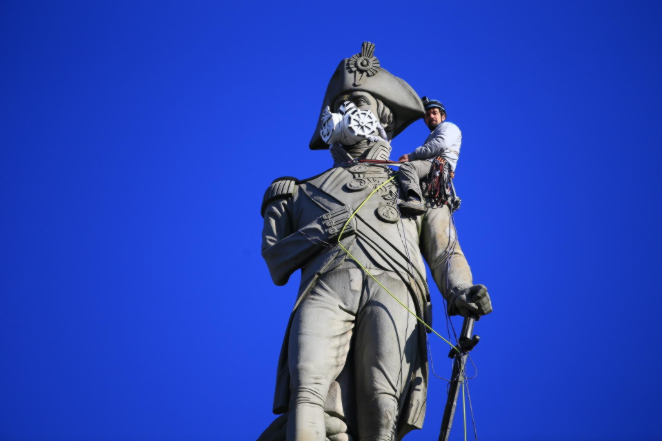
London - A Greenpeace activist mounts a fake anti-gas mask
on the Nelson statue in Trafalgar Square.
1806 ticket to attend Nelson's funeral at S.Paul Cathedral
Click the image to enlarge
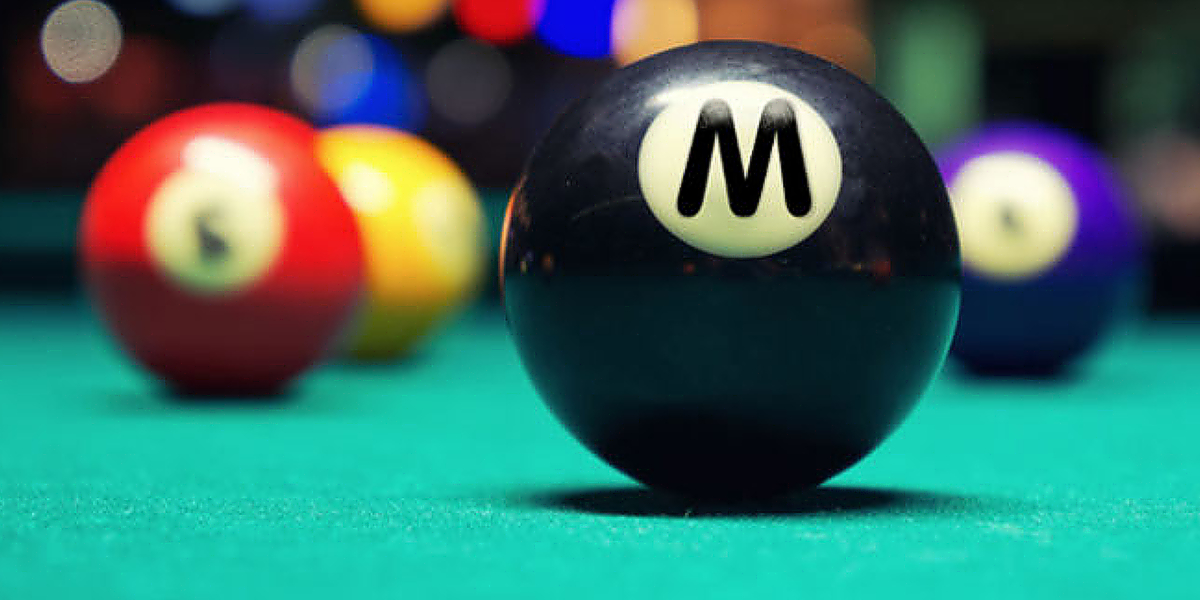
We thank all of Modus’ numerous readers, who, with their continuous attention make sense of our work.
For those who would like to be informed in real-time of our online publications, and have an active profile on Facebook, we recommend giving likes on the Modus fan page: they will be able to directly link to all newly published articles.
The editorial staff
1 lettore ha messo "mi piace"
